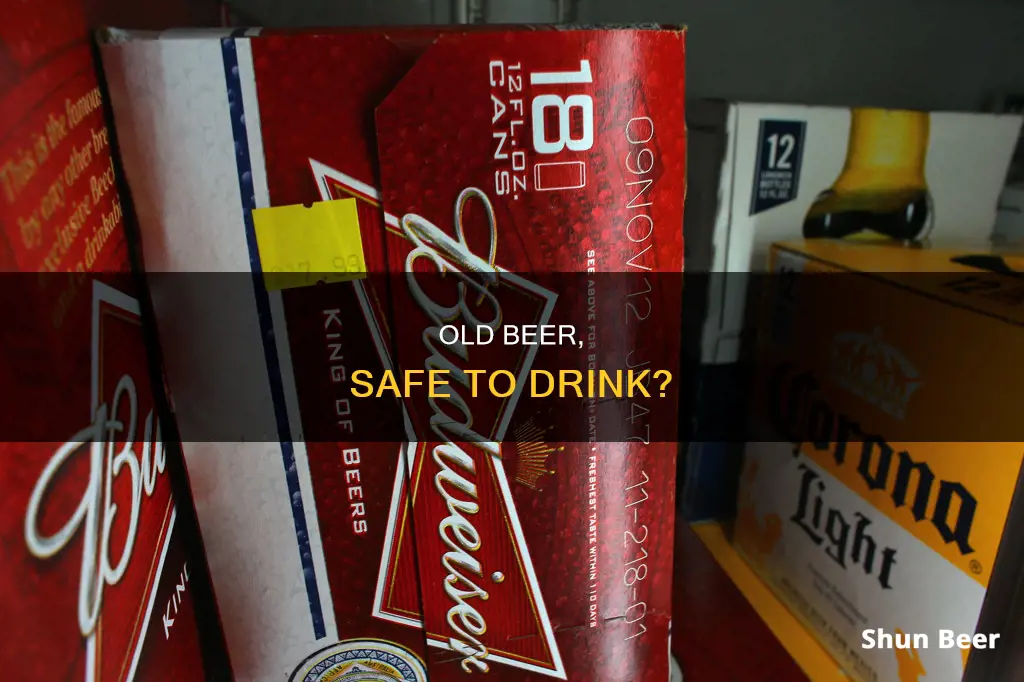
Is it safe to drink 2-year-old beer? This is a question that has plagued beer enthusiasts for years, and the answer may surprise you. In almost all cases, drinking expired beer is safe and won't make you sick. The fermentation process, low pH level, and alcohol content in beer create an unfriendly environment for microorganisms, ensuring that even if a beer sits on the shelf for years, it's unlikely to cause harm. However, there are a few exceptions and factors to consider when it comes to the safety and taste of old beer.
What You'll Learn

Beer doesn't expire but its taste can change
Beer is a fascinating beverage with a rich history and a dedicated following. While it doesn't technically expire, its taste can change over time, and this evolution in flavour is an intriguing aspect of the beer-drinking experience.
Firstly, it's important to understand that beer, unlike some other beverages, is resistant to pathogens. This is due to its fermentation process, low pH level, and alcohol content, which create an environment that is unwelcoming to harmful microorganisms. So, even if a beer has been sitting on a shelf for years, as long as it's sealed, it is unlikely to pose any health risks. This is a crucial distinction to make and should reassure drinkers who are concerned about the potential dangers of old beer.
However, that doesn't mean that beer is completely impervious to the effects of time. The taste of beer can change, and what was once a refreshing, delicious brew can become less appealing. This transformation is influenced by various factors, and understanding these factors can help drinkers manage and even manipulate the ageing process to their advantage.
One of the critical elements in beer ageing is oxygen. Even with modern canning and bottling techniques, a small amount of oxygen finds its way into each vessel of beer. This oxygen interacts with the compounds from malt, yeast, and hops, resulting in oxidation. Oxidation is the culprit behind that disappointing papery or cardboard-like taste that can develop in light-style beers like pilsners.
Heat is another factor that can negatively impact the taste of beer. While storing beer at room temperature for a short period won't cause significant harm, exposing beer to high heat or major temperature fluctuations can accelerate oxidation and negatively affect its flavour. So, it's best to keep your beer in a cool, dark place, preferably a refrigerator, to maintain its quality.
UV radiation from sunlight is another enemy of beer. Hops, a key ingredient in beer, are sensitive to UV rays, and even a brief exposure to sunlight can cause a chemical reaction that produces a compound with a distinct skunky flavour. This is why most beer bottles are tinted brown, and the increasing use of aluminium cans also helps protect beer from lightstrike.
While these factors can negatively impact the taste of beer over time, it's worth noting that certain beer styles are more susceptible than others. Light beers, such as pilsners, lagers, and wheat beers, tend to be more delicate and can develop off-flavours more quickly. On the other hand, heavier beers with higher ABV (alcohol by volume) contents, like bottle-conditioned beers, stouts, and porters, can actually benefit from ageing and develop richer, more nuanced flavours.
The ageing process can be a double-edged sword when it comes to beer. While it can detract from the flavour of some styles, it can also enhance and add complexity to others. This is why some beer enthusiasts intentionally age certain beers, especially those with higher ABVs or unique yeast and bacteria cultures, to create a drinking experience that is truly unique.
In conclusion, while beer doesn't expire in the traditional sense, its flavour can change over time. This change can be undesirable in some cases, but it can also be a sought-after outcome for beer connoisseurs who appreciate the complexities that ageing can bring. So, the next time you come across an old beer, remember that it's probably safe to drink, but its flavour may have evolved into something completely different from what you'd expect from a fresh brew.
Caveman Country: Beer, Fun and Adventure
You may want to see also

Beer is unlikely to make you sick
Of course, that doesn't mean the beer will taste good. Over time, the taste of beer can change, and it may not be as refreshing as you'd hoped. Heat, light, and oxygen can all cause beer to spoil or skunk, and these factors can affect the beer's flavour. High-gravity beers, like barley wines or imperial stouts, can benefit from ageing and develop richer flavours. On the other hand, low-gravity beers can start to taste stale much more quickly. So, while a two-year-old beer is unlikely to make you sick, it may not taste as good as a fresh one.
A Risky Mix: Beer and Benzonatate
You may want to see also

Beer is best stored in a cool, dark place
Heat speeds up oxidation, so storing beer in a refrigerator is ideal. Major changes in temperature, like from an ice-cold cooler to a hot car, can cause permanent damage to your beer. According to professionals from Seattle area breweries, if you have a beer that lasts one year in the fridge, it will only last three days in the trunk of your hot car.
UV light is another enemy of beer. The harmful rays will react with the hops in your beer, causing permanent damage. Brown bottles are best for filtering out sunlight, followed by green bottles, while clear bottles offer no protection. That's why many craft brewers use brown bottles.
If you're storing beer at room temperature, make sure it's not exposed to sunlight. Keep it in the coolest, darkest place in your house, like a pantry or a cupboard.
If you're storing beer in the refrigerator, it's best to keep it in its original packaging until you're ready to drink it. This will help protect it from light and oxygen.
In addition to keeping beer cool and out of sunlight, it's important to store it upright. This minimises the amount of beer that's exposed to oxygen, slowing the rate of oxidation.
Exploring Beer Drinking on the Beach: Is It Allowed?
You may want to see also

Beer exposed to sunlight can undergo a chemical reaction, producing a skunky flavour
Beer is generally safe to drink, even if it's two years old, as long as it's sealed. However, the flavour of beer changes over time, and it can be affected by oxygen, heat, and light. Beer exposed to sunlight can undergo a chemical reaction, resulting in a "skunky" flavour.
The Effect of Light on Beer
Preventing Skunky Beer
To prevent skunky beer, it is recommended to store beer in a cool, dark place, preferably a refrigerator. If stored at room temperature, ensure that the beer is not exposed to sunlight. Additionally, it is best to keep beers in an upright position, as this minimises exposure to oxygen.
Beer Packaging and Skunking
The packaging of beer also plays a role in preventing skunking. Dark glass bottles, such as brown bottles, absorb the wavelengths of light that cause skunking and are better at protecting the beer from UV exposure than clear or green glass bottles. Aluminium cans and kegs are even more effective at blocking UV light, making them ideal for storing beer.
JL Beers' Mixed Drink Options: What's Available?
You may want to see also

High-gravity beers can benefit from ageing
While beer doesn't really "go off", its flavour profile will change over time. Even with that said, it's still safe to drink beer that's been sitting in your cupboard for years, as long as it's sealed.
High-gravity beers, which are brewed with a high sugar content to create a higher alcohol content, can benefit from ageing. The ethanol content in high-gravity beers increases the permeability of the yeast cell's membrane, causing it to leak important amino acids and other components that are vital to the cell's health. This can slow down the fermentation process, so it's important to select a yeast strain that can tolerate high levels of ethanol.
There are several techniques that can assist in healthy fermentation for high-gravity beers. One method is to use healthy yeast cells at a higher pitch rate. High-gravity beers typically contain more complex sugars that are harder for yeast to ferment, so having a sufficient and healthy yeast population is crucial. Fresh liquid yeast strains tend to have a higher cell count and viability compared to dry yeast, and they are also able to ferment a broader range of sugars.
Another technique is to supplement the wort with additional yeast nutrients and enzymes. Nutrient deficiencies are one of the primary limitations in high-gravity brewing, so adding a nitrogen source, such as glutamine or asparagine, can help keep the yeast healthy.
By using these techniques, brewers can create high-gravity beers that benefit from ageing and develop a more complex flavour profile over time.
Stout Beer and Diabetes: Is It Safe?
You may want to see also
Frequently asked questions
Yes, it is safe to drink 2-year-old beer. Beer doesn't spoil in the same way that food does, and there are no known pathogens that can live in beer.
That's safe to drink, too.
You probably won't enjoy it, but it won't harm you.
It's safe to drink, but it won't taste good.
It's fine to drink, but it won't taste great.







